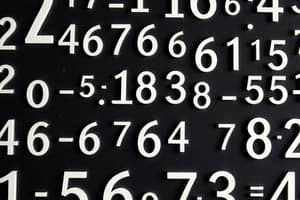Podcast
Questions and Answers
Which of the following statements is true about real numbers?
Which of the following statements is true about real numbers?
- Real numbers include both rational and irrational numbers. (correct)
- Real numbers can be both rational and irrational simultaneously.
- All real numbers are rational.
- All real numbers are irrational.
What is the relationship between rational numbers and irrational numbers on the number line?
What is the relationship between rational numbers and irrational numbers on the number line?
- Rational numbers occupy specific points on the number line, while irrational numbers occupy gaps between them.
- Irrational numbers are densely packed on the number line, leaving no space for rational numbers.
- Rational numbers form a continuous line on the number line, while irrational numbers exist as isolated points.
- Both rational and irrational numbers are evenly distributed throughout the number line. (correct)
Who proved the irrationality of π?
Who proved the irrationality of π?
- Lambert and Legendre (correct)
- Cantor and Dedekind
- Archimedes and Apollonius
- Pythagoras and Euclid
What is the correct symbol used to represent the set of all real numbers?
What is the correct symbol used to represent the set of all real numbers?
Which of the following numbers is NOT an example of an irrational number?
Which of the following numbers is NOT an example of an irrational number?
What is the defining characteristic of an irrational number?
What is the defining characteristic of an irrational number?
Which of the following is NOT an irrational number?
Which of the following is NOT an irrational number?
Who were the first to discover irrational numbers?
Who were the first to discover irrational numbers?
What was the specific irrational number that Hippacus of Croton is said to have discovered?
What was the specific irrational number that Hippacus of Croton is said to have discovered?
What is the significance of the fact that there are infinitely many irrational numbers?
What is the significance of the fact that there are infinitely many irrational numbers?
Which of the following is NOT a myth about the discovery of √2 being irrational?
Which of the following is NOT a myth about the discovery of √2 being irrational?
Which of the following statements about irrational numbers is TRUE?
Which of the following statements about irrational numbers is TRUE?
What year did Theodorus of Cyrene prove the irrationality of several numbers?
What year did Theodorus of Cyrene prove the irrationality of several numbers?
Flashcards
Irrational numbers
Irrational numbers
Numbers that cannot be expressed as a fraction of integers.
Real numbers
Real numbers
The set of all rational and irrational numbers represented on the number line.
Unique point on number line
Unique point on number line
Every real number corresponds to exactly one point on the number line.
Cantor and Dedekind
Cantor and Dedekind
Signup and view all the flashcards
Proof of π's irrationality
Proof of π's irrationality
Signup and view all the flashcards
Rational Number
Rational Number
Signup and view all the flashcards
Pythagoreans
Pythagoreans
Signup and view all the flashcards
Example of Irrational Number
Example of Irrational Number
Signup and view all the flashcards
Natural Numbers vs Whole Numbers
Natural Numbers vs Whole Numbers
Signup and view all the flashcards
Integers vs Whole Numbers
Integers vs Whole Numbers
Signup and view all the flashcards
Study Notes
Rational Numbers
- A rational number can be expressed as p/q, where p and q are integers, and q ≠ 0.
- Examples of rational numbers include fractions, integers, and terminating or repeating decimals.
Irrational Numbers
- An irrational number cannot be expressed as p/q, where p and q are integers, and q ≠ 0.
- Irrational numbers are non-repeating, non-terminating decimals.
- Examples of irrational numbers include √2, √3, π, and certain infinite decimals.
- The Pythagoreans were among the first to discover irrational numbers, around 400 BC.
- Key irrational numbers, like √2, √3, √5... were proven irrational by ancient mathematicians.
Real Numbers
- Real numbers encompass both rational and irrational numbers.
- Every real number corresponds to a unique point on the number line.
- Every point on the number line represents a unique real number.
- Real numbers form the complete set of numbers we use in various mathematical contexts.
Examples:
- √0 is a rational number.
- π cannot be expressed precisely as a fraction of integers, this makes it irrational.
- The number line is a complete representation of real numbers.
- Irrational numbers are infinitely long decimals, that never repeat.
Studying That Suits You
Use AI to generate personalized quizzes and flashcards to suit your learning preferences.



